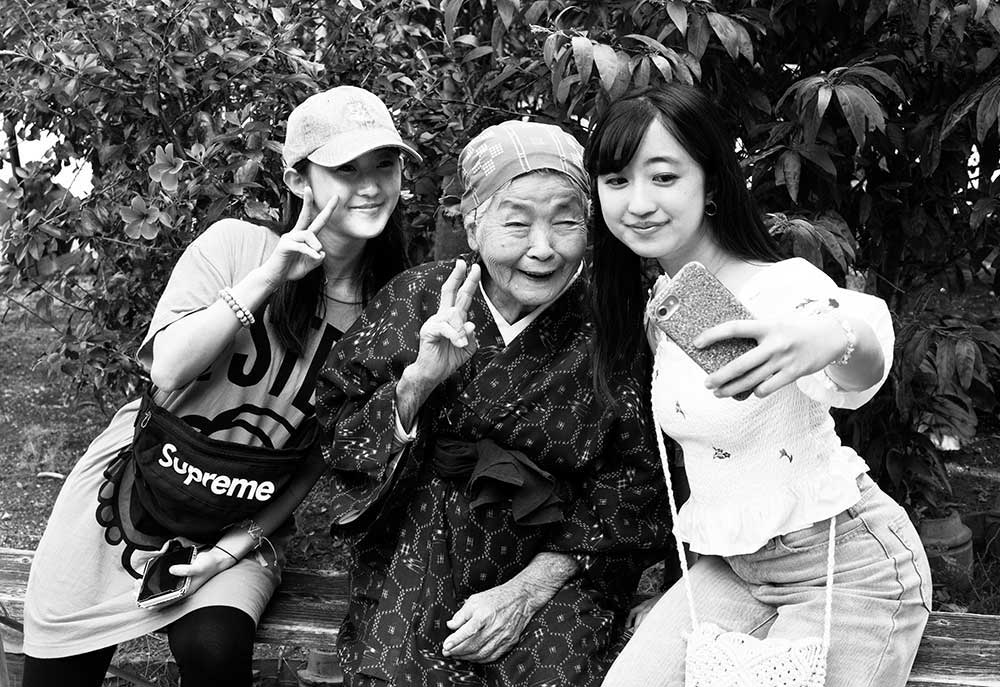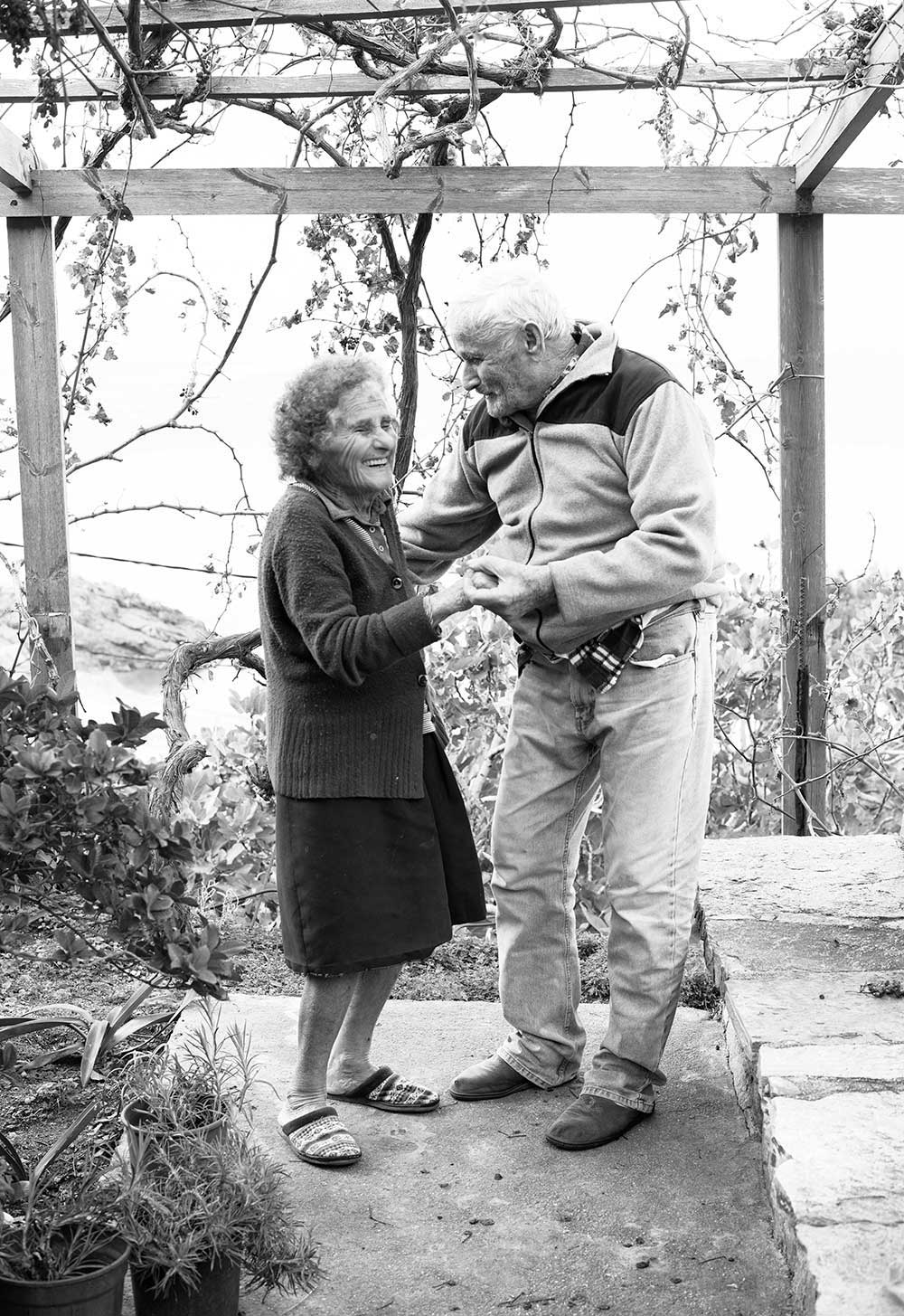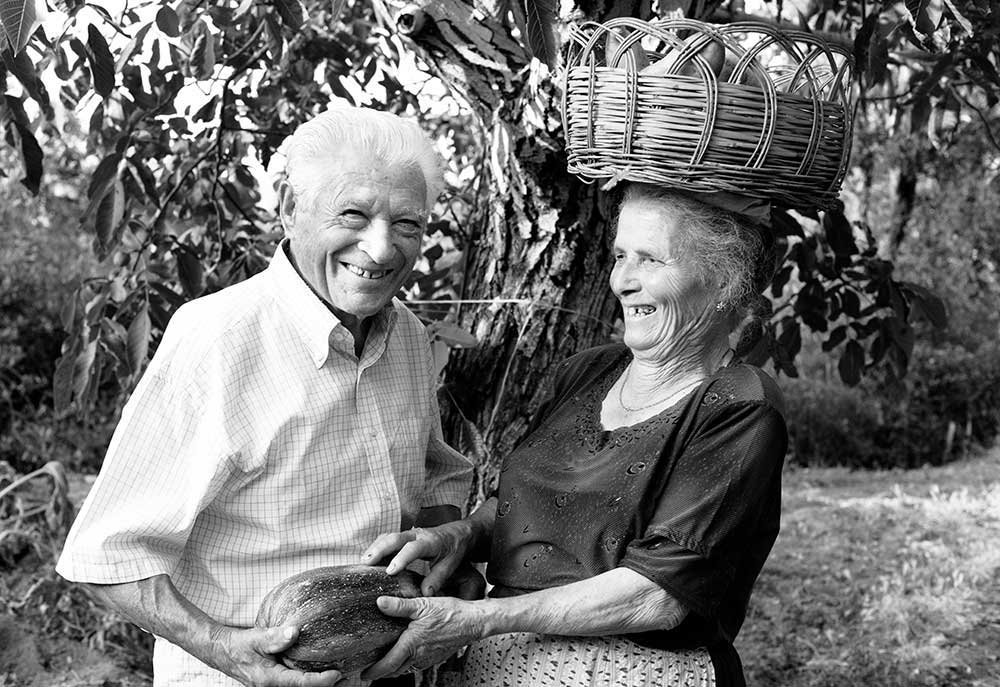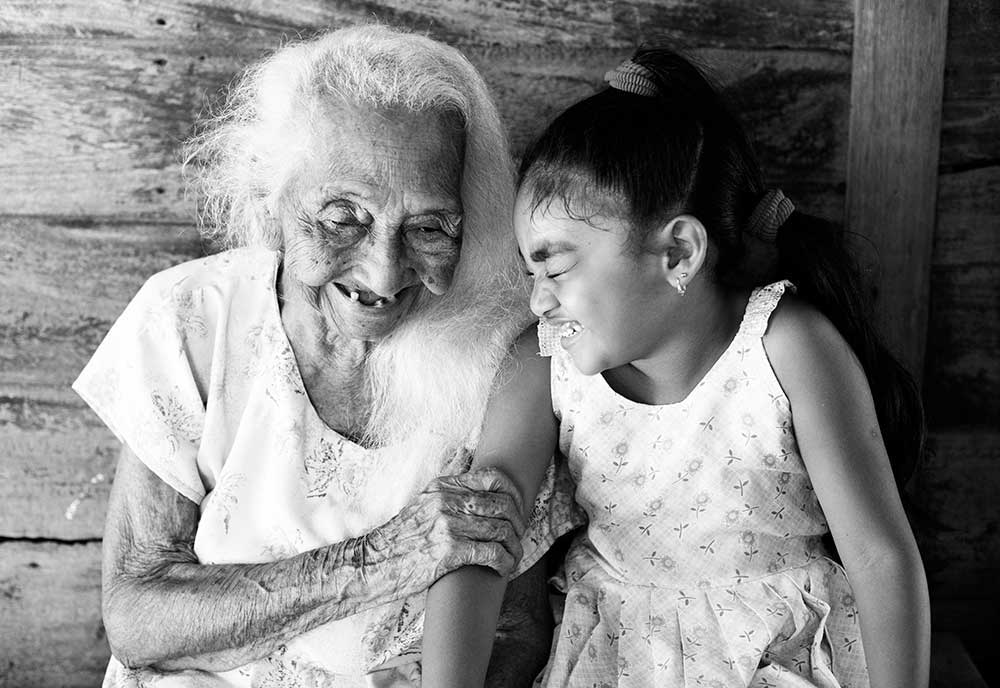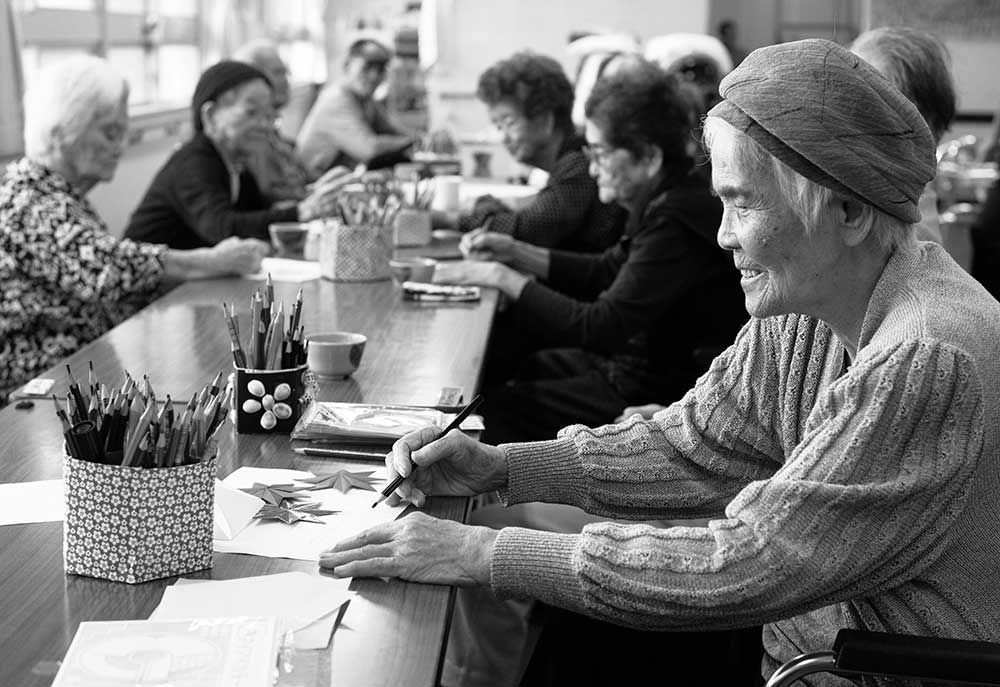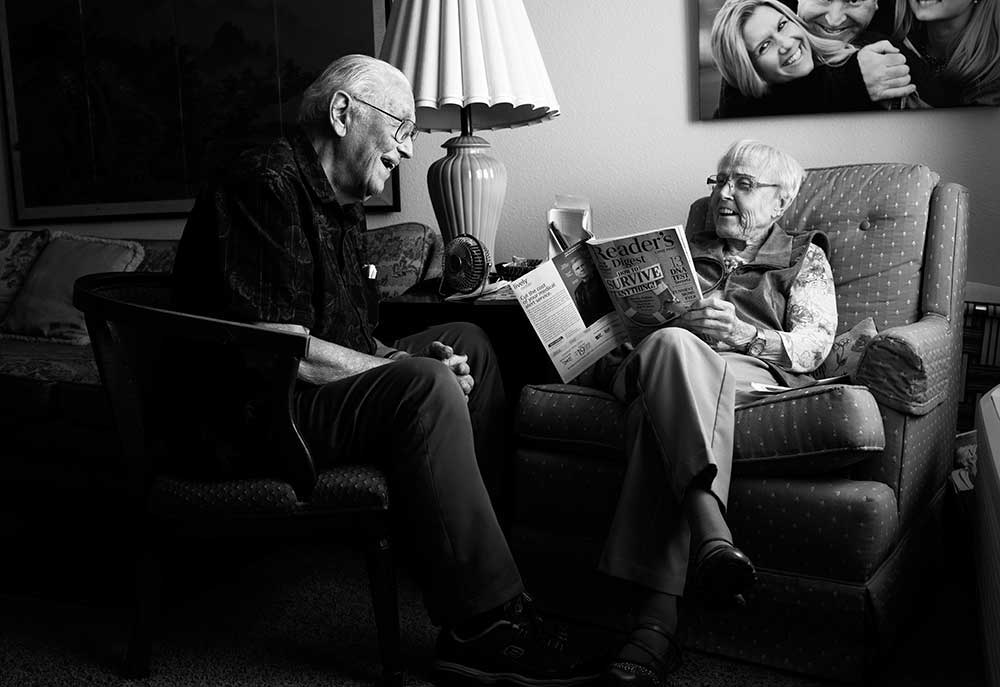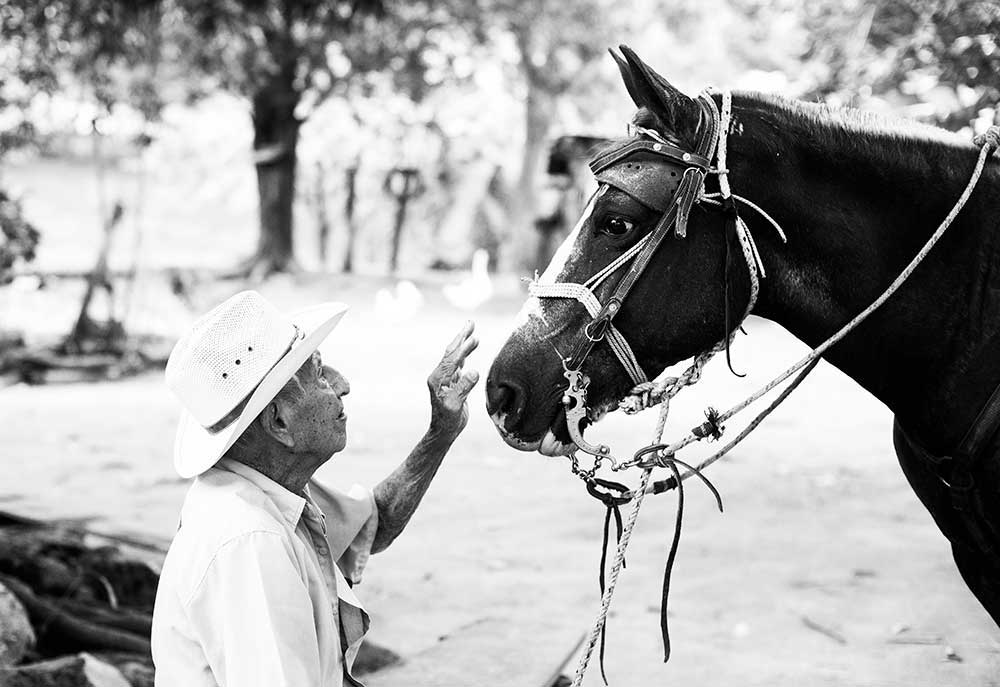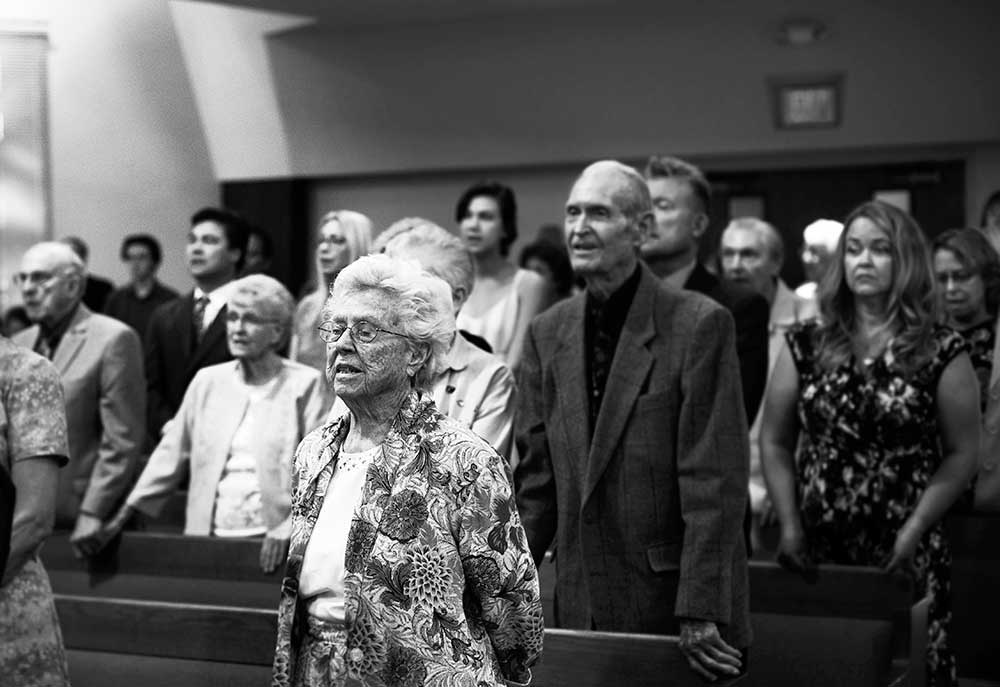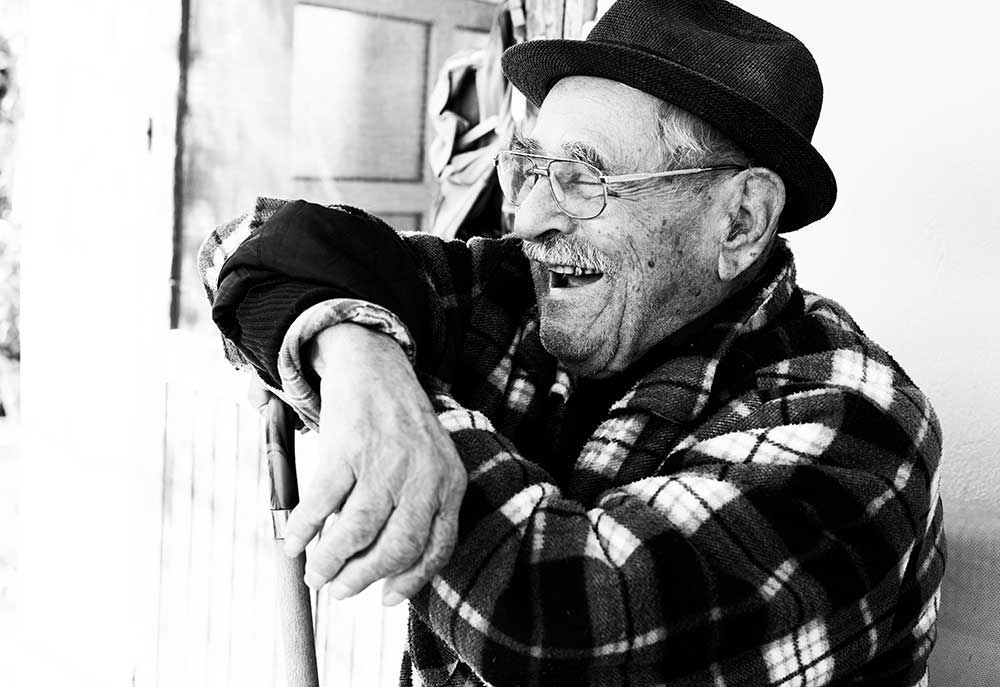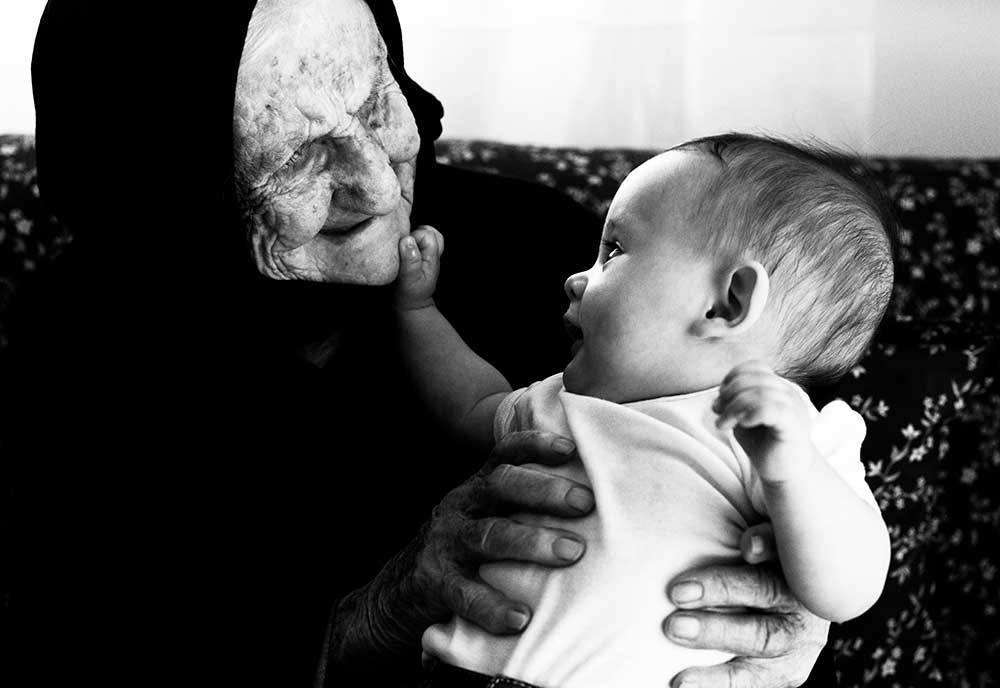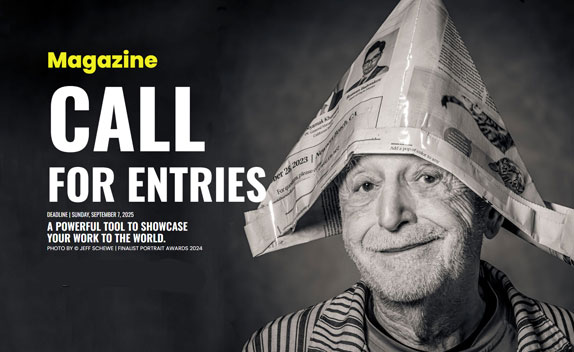The COVID-19 pandemic brought to light the deplorable living conditions of seniors in many countries around the globe.
The weakening of family ties, the deterioration of social connections and the precariousness of front-line workers have given rise to a model of geriatric care based on marginalization, a model which has revealed its flaws and forces us to rethink old age.
The Québecoise Arianne Clément has been investigating aging and its challenges for several years, through a series of photographic reports. Which aspects of aging are cultural and which are universal? How do societies, governmental structures, families and the elderly themselves handle aging abroad? What makes some people age gracefully while others decline? Are there places on Earth where aging is easier? What are the different perceptions of aging according to various cultures?
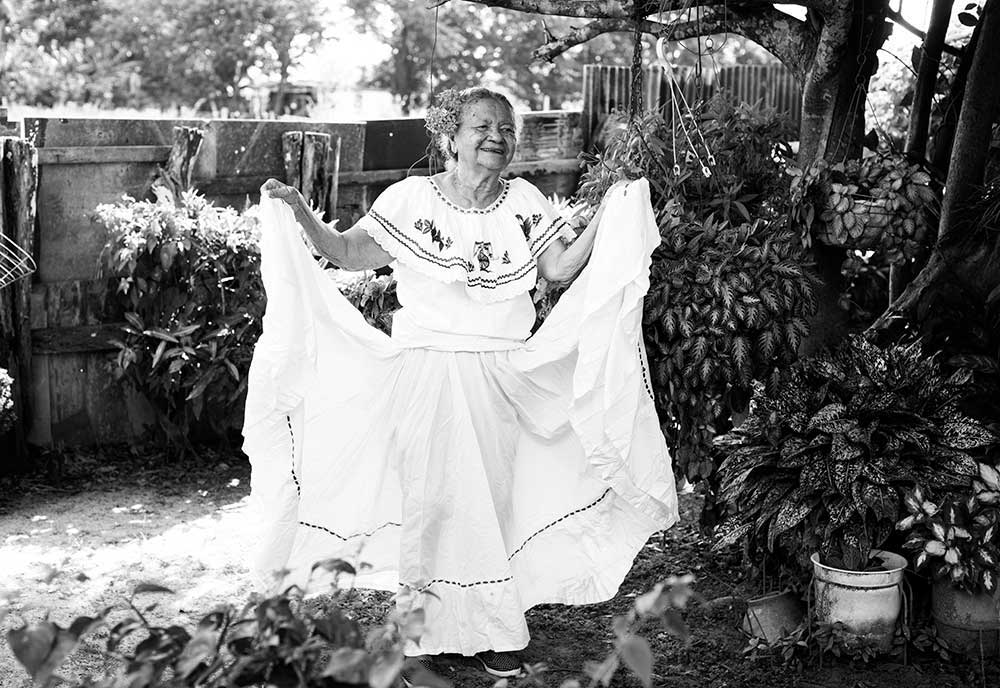
Los Jocotes, Nicoya peninsula, Costa Rica
Here is my advice in order to live to a hundred. You must eat simple and whole food, chew well, sleep soundly, take care of oneself with plants and natural products, avoid conflict and never speak ill of others. I would also advise young people to pursue their education. My greatest regret is not getting an education. If I could have, I would have liked to become a nurse, or a violinist. Practicing the traditional dancing of Costa Rica has been a great source of pleasure all my life. When I stopped dancing I got rid of all my dresses except one. I want to be buried in that beautiful dress.
It is with these questions in mind that she has traveled the world in search of different approaches with regards to aging. In recent years she has visited the “blue zones”, places renowned for the vitality and well-being of their elderly. The blue zones, designated in 2005 by National Geographic magazine, are the five regions of the world with the highest concentrations of very old people and where life expectancy is exceptionally high because of the lifestyle practiced by their inhabitants.
Counted amongst the blue zones are the province of Ogliastra, on the island of Sardinia in Italy; the Nicoya Peninsula, Costa Rica; the California Seventh-day Adventist community in Loma Linda and surroundings, United States; the Okinawa archipelago in Japan and the island if Ikaria in Greece. Since 2005, the increased media diffusion of the phenomenon has popularized these “secrets” of longevity:
- A simple existence relatively untouched by modern pressures;
- A healthy, unprocessed and predominantly vegetable diet, often from subsistence farming;
- A very attentive social or family net;
- Daily physical activity;
- Time spent each day enjoying existence and cultivating one’s mental, spiritual or religious life.
Arianne Clément went to meet the elders of the blue zones, sharing their daily lives, sometimes living under their roof, documenting their lifestyle through photography. She understood how to bond with many of these elderly people and gather testimonies through which they may share their wisdom, experiences, joys, worries and the challenges they face with us. These stories help to correct pervasive prejudices about aging and to demystify certain beliefs surrounding longevity. This photographic journey, coupled with an anthology of life stories, exposes the richness and complexity of the human experience.
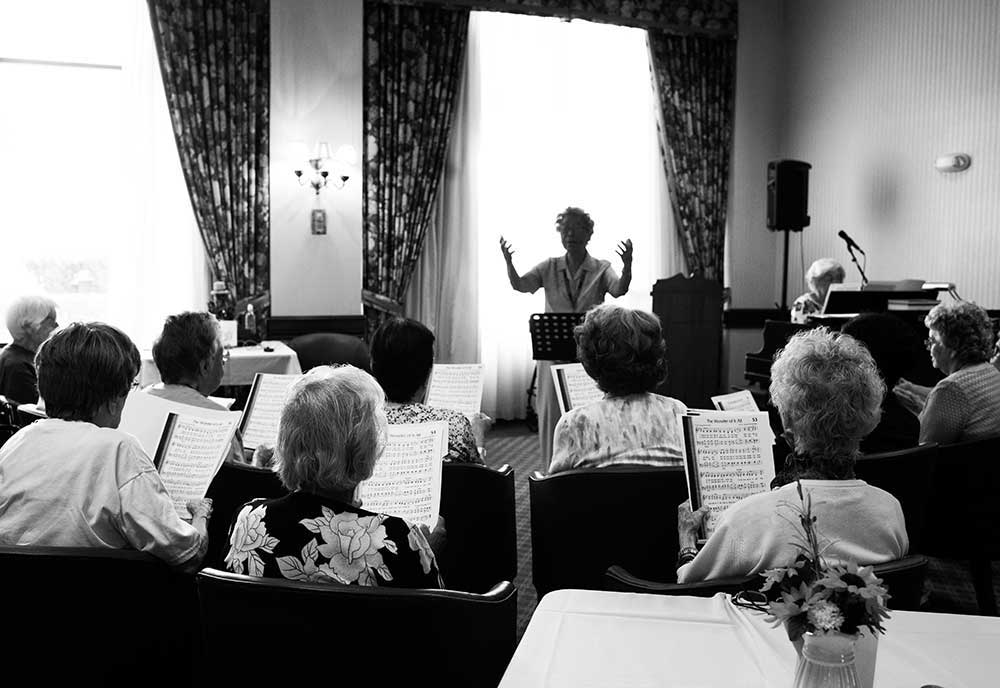
Loma Linda, California, United States
Art takes up a large space in my life. God wants us to take care of our health, and for us to reject everything that does not lift the spirit. Art lifts the spirit. Music, visual arts and literature are examples. Personally I take part in a choir, I write my memoirs, I play piano, I help out with film projections and I would like to get back to painting. I also go to aerobic exercise and I participate in many meetings and assemblies. I have many friends and am very active on Facebook. I have a boyfriend now. I had a weakness for him the moment he arrived at the Adventists Elders Centre where I live and things have developed. We talk and we hug. I think it is excellent for one’s longevity.
The approach of the inevitable is never easy, but the fact remains that there is beauty in aging, and that serenity in the face of death is something that must be cultivated. This is what the inhabitants of the blue zones teach us. Their teaching is all the more precious since the growing impact of globalized modernity, the changing lifestyle habits of the young generations and the disturbances linked to tourism and the media reveal the fragility of the blue zones and the exceptional character of these elders in human history.
This report, which parallels different lifestyles and varied beliefs around the world, is part of a militant approach to promoting seniors. It is a way of paying tribute to the elderly for the knowledge and values they have transmitted to us and for the social and political struggles they have fought. With nuance and without complacency, Arianne Clément wishes to highlight the importance of the contribution of elders to our modern society and to highlight the richness of their knowledge.
In the context of a pandemic, which exposes the vulnerability of seniors more than ever, the experience of the blue zones invites us to rethink our way of doing things, to favour inclusion rather than marginalization, to draw inspiration from the experience of our ancestors, to cultivate strong ties, both at the family and community level and to give ourselves the collective means to allow the elderly to pursue their lives with dignity.
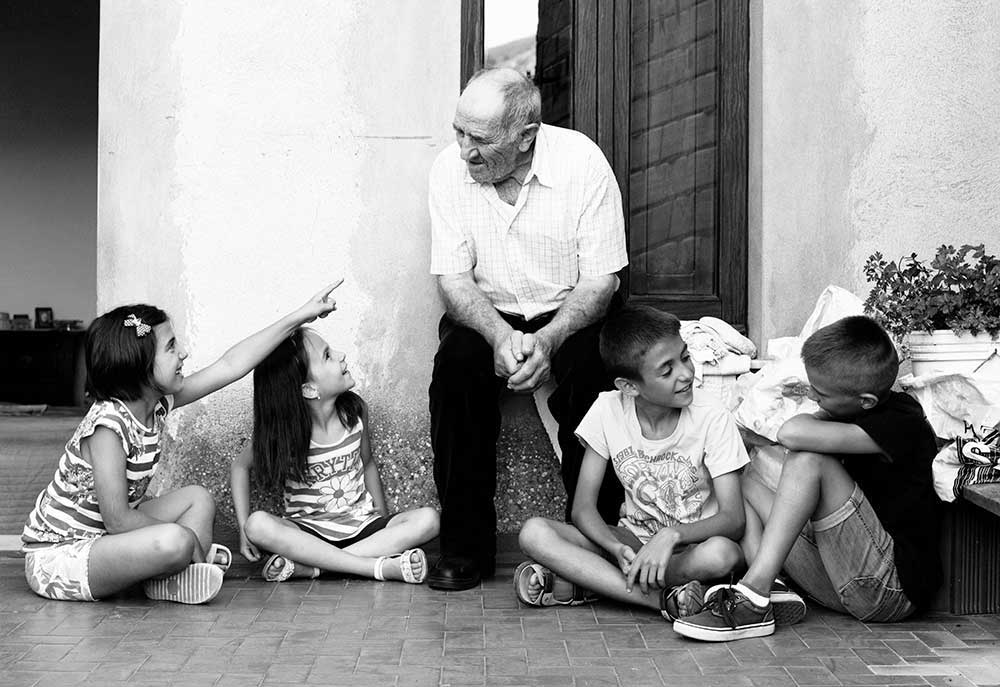
Villagrande, province of Ogliastra, Sardinia, Italy
As a shepherd I have always been very poor and I have had a hard life. I spent my life walking outdoors, day and night, good times and bad. Like most shepherds in Sardinia, I began working very young and I never had much education. All that to say that I am generally satisfied with my life. Each morning I feed the animals; it makes me happy to work a little and stay occupied. We must keep working for as long as we can. I was gardening today for example. We grow everything: potatoes, beans, zucchinis, tomatoes, everything. My garden feeds six of my relatives’ households. It’s wonderful to have such a close family.
About Arianne Clément
After obtaining a master’s degree with honours in photography from University of the Arts London, Arianne Clément travelled far and wide to find inspiration, often getting involved in humanitarian projects with the marginalized, her preferred subjects. She now devotes her work principally to portraying the elderly. Her celebrated portraits of seniors have been exhibited nationally and internationally, and won her several prizes, grants and honours. What these distinctions reflect first and foremost are the sensitivity and boldness of her work and the unique connection she manages to create with her models. Her pictures and stories were published in major newspapers and prestigious journals all around the world and her work was met with enthusiastic response online, creating a buzz in social media. [Official Website]
Yomitan village, Okinawa prefecture, Japan
When I was younger I had a humble business; I sold odds and ends. It was enough to survive, but barely. When I was 80 years old I decided to realize my dream of becoming a dancer. I approached a traditional Okinawan dance troupe that performs for tourists and, as I was truly determined to learn, they gave me a chance. Now I am the star dancer! I am in perfect health, I have no illnesses and I take no medication. At my last medical exam my doctor was jealous of my impeccable health. The secret? Laugh, laugh and laugh! Don’t let anger, hatred or worry live within you. Make an effort to love and accept all others. Be active, go out, party, dance, play music and embrace life!
Nas, Ikaria Island, Greece
Life isn’t complicated around here. We eat almost exclusively what we produce. For everything else, the baker comes to deliver bread to us every morning and the fishmonger comes once a week. I have been married to Ioannis Melis for 63 years. In order for a relationship to last, you must not bicker over trivial things and you have to get over small annoyances. When your partner is angry, it’s best to shut up and wait for the dust to settle before talking to them about what’s bothering them. People put too much emphasis on little annoyances instead of letting them pass. It’s sad to see couples tearing themselves apart over pride. You shouldn’t wait until your partner is sick or dead before you realize how much they mean to you. My husband and I have been through hard times, but we love each other deeply.
Villagrande, province of Ogliastra, Sardinia, Italy
When I was younger life was harder, and yet I think it was more beautiful than nowadays. There was a lot of affection between people, we loved each other very much and we understood one another. I made many sacrifices in my life and I worked hard, but always with love, contentment and gratitude. I was never jealous or envious. When a thing is beautiful, I admire it. I compliment it. I don’t desire it, because it is useless. What I have is enough. I have nothing, yet I have everything. I have love. The love of my husband and my grandchildren and that is all that matters.
Copal de Quebrada Honda, Nicoya Peninsula, Costa Rica
I haven’t lost my head and my memory is excellent. Visitors from the four corners of the earth have come to speak with me about longevity and I hope that they keep coming since I love meeting strangers! I am grateful to be in such good health and I would like to live for many more years. I don’t want to die, I love life. I want to see my great grandchildren grow up. I advise young girls to carry themselves well, to look after themselves, not to walk the streets at night, not to take drugs or drink alcohol, and to choose an attentive lover.
Nakijin-son village, Okinawa prefecture, Japan
I had two professions: cultivator of silkworms and teacher of calligraphy. One must meditate for a long time before choosing a career, and once it is chosen, one must persevere relentlessly. Today I still practice calligraphy for pleasure, I cultivate flowers, I write each day in a journal and I go often to the camp for the elderly. I have a good temperament, I am always in good humour, peaceful and co-operative.
Christos Raches, Ikaria Island, Greece
The longevity of Ikaria is certainly due to the fact that we eat local, organic, unpasteurized honey every day whose therapeutic properties are amazing.
When I was about 14 years old I read a book about bees and I discovered the incredible contribution of bees to ecology, thanks to pollination. When I was 18, I decided that I would dedicate my life to beekeeping. I could have been content as a honey merchant, but my philosophy is not to exploit nature excessively; I work in harmony with it instead by contributing to the balance of ecosystems. The quality and price of honey have changed a lot over time. In the 1950s, sugar was worth almost twice as much as honey. We didn’t know the benefits of honey and it had no value. The pastry chefs used it only to save on the price of sugar. However, the wax brought in a little money because we were still lighting the cottages by candlelight. Later, many studies have shown that we produce one of the best qualities of honey in the world. I have already tasted American honey and, without wanting to offend anyone, in terms of therapeutic properties, it is no better than corn syrup. Here, the air and water are pure and our bees forage from a wide variety of bushes, trees, herbs and wild flowers. The rocky soil gives a lot of minerals to the plants and thus to the honey as well. There are no pesticides on the island and our bees have never been affected by the infections and diseases that plague bees around the world.
Loma Linda, California, United States
I was a surgeon and I stopped practicing at the age of 89. My career has allowed me to both contribute positively to society, and to be fulfilled as a human being. I encourage young people to acquire a good education. It is essential to completely realize oneself. I take care of my health; I am a vegetarian and almost a vegan. I allow myself an ice cream once a week and the rest of the time I eat only healthy food. I also do a lot of stationary cycling and take part in an aerobic exercise group. Unfortunately, my eyesight has worsened terribly. Since I love to read and stay informed, my wife reads to me every day. She reads me news, religious texts, health articles, biographies, etc. It is important, as one gets older, to stay curious and to nurture one’s mind.
Nicoya, Nicoya peninsula, Costa Rica
I was in excellent health until I took a round of antibiotics recently; since then I can’t walk and have no appetite. This medicine is no better than poison, if you want my opinion. My goal is to walk again regardless. Despite everything, I am always in a good mood and I like to receive visitors. I am particularly stylish and flirtatious and I collect shoes and fancy hats. The secret to a long life is to take care of oneself, to have a healthy lifestyle, to be satisfied, calm and to have a happy marriage. You shouldn’t get married on a whim, you have to take your time and carefully choose your partner.
Pochote de Nicoya, Nicoya Peninsula, Costa Rica
I left school at 9 years old because I had to work. I have been a cowboy all my life and horses have always been my great passion. I am very attached to my horse Corazon, my companion of more than twenty years already. I have lived a far from exemplary life. I have indulged in every imaginable vice: alcohol, dancing, women, parties, tobacco. I had to stop drinking and smoking at 60 as I had health problems. Just about everything is difficult when one gets old. One must struggle endlessly. It bothers me greatly to not have energy, to lose my memory, to walk with difficulty. I used to regularly pay visits to the sick of the surrounding area but my health no longer allows it. Luckily the Lord is with me.
Mountain Home Village, California, United States
I live alone in a small cabin beside a stream. The housework and the maintenance of the grounds and garden keep me very busy. I never get bored. I still drive my car, I help with the church administration, I read a lot and I see friends every day. The Seventh-day Adventist community is very close. I also have friends outside the church, including Catholic friends, Mormons and even a few hippies! My plans for the future? Set up a club for young people where we watch DVDs with themes about youth and personality development.
Plagia, Ikaria Island, Greece
Since I went blind, I can’t work as much as I used to, but I’m doing well. I don’t believe in God and the majority of people here don’t believe either. When I was eight, one of my teachers was a communist and introduced me to his ideology. When he was expelled from school, he had already made several disciples and his philosophy continued to spread across the island of Ikaria. At 13, I was expelled from school for reading Marxist literature. From that moment on, I became a fervent follower of communism and I still am today since the class struggle is far from won. My friends and family are activists, as are most of the people on our island, also known as the “Red Island”.
Villagrande, province of Ogliastra, Sardinia, Italy
I always dress entirely in black and I wear a black veil because my husband is dead and tradition is that a widow dresses this way. I don’t know what will happen when I reach the end of my life. No-one knows, but I do not fear death. The cycle of life goes on.



